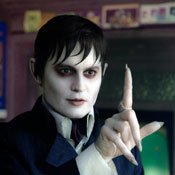"Blood is thicker than water," says Barnabas Collins (Johnny Depp), the eloquent lord of an idyllic New England fishing port. Barnabas' voice lingers through gorgeous, haunting images created by director Tim Burton of a gothic past where entrepreneurial seamen make riches beyond expectations and a blonde beauty adorned in baby-blue satin sinks to the bottom of the ocean floor.
"Dark Shadows," based on the television soap opera of the 1960s, mixes beauty, surrealism and gore. It starts off as a smoldering bodice ripper complete with a dark, handsome vampire (a necessary component in any post–"Twilight" flick). But when the fog begins to settle into post-modern, there's nothing for you to sink your teeth into. We've seen these tricks of Burton's deft directing hand before, and the brilliant opening quickly wears down into a cruel parody of banality.
The story starts with a woman scorned. Not an ordinary mortal woman, but a witch named Angelique (Eva Green). When Barnabas scorns Angelique's love for the virginal Josette (Bella Heathcote), Angelique curses the entire Collins family. A seahorse sculpture crushes Barnabas' parents. Josette throws herself over a cliff and into a rocky sea. An angry mob, whipped into frenzy by Angelique, chains and buries Barnabas, who spends the next 196 years in a coffin.
The next we see of Barnabas, he's very pale and thirsty. You simply cannot imagine how thirsty! Barnabas rewards his liberators with death. Satiated from his rampage, Barnabas trots home along the beaten path that turns into a road. He's never seen a road, a car or a gas station before. It's 1972, and the world has changed. But Barnabas is still the same. "Blood binds us and curses us," he says.
Barnabas connects with the family, learns the new ways and eventually beats to the new rhythms of the day. "Such a feelings coming over me. There is wonder in most everything I see. Not a cloud in the sky, got the sun in my eyes, and I won't be surprised if it's a dream," Karen Carpenter sings in the background, the theme of Barnabas' new life. He renovates the family home, restarts the fish cannery and makes war on Angelique who has taken over the town. He also makes love to her, and that scene is one of the funniest in the entire movie.
Burton pulls out all the shtick. Weird effects, comic constructs, busy pacing, secret passageways, sculptures that come alive, beautiful Michelle Pfeiffer (who has perhaps never looked more radiant than on top of a piano), a teenage girl with a razor sharp adolescent edge, a little boy who sees his dead mama––but none of it firmly hooked me in. The strongest current I felt was from the 1972 bits of nostalgia, with tiny songstress Carpenter blasting us into a culture of lava lamps and free love.
Unlike Burton's other films ("Beetle Juice," "Edward Scissorhands," "Alice in Wonderland"), the ingenuity level gets snuffed out early, somewhere in the transition from old-world charm to new-world funk. The film is a nutty, incongruous, monster mash. Burton tries anything and everything for effect, and only occasionally manages something marginally funny, like Barnabas screaming at the tiny songstress on the television. Elaborate as the gags are conceived, there really isn't much plot, only a parade of arbitrary visual tricks to hold the film together.
Johnny Depp makes a good impression as Barnabas. The other actors perform well, but they are limited by the stupidity of the material. By the final scene, where everything catches fire and comes crumbling down, you will be thinking, if not screaming: "Burn baby, burn!"



Comments
Use the comment form below to begin a discussion about this content.